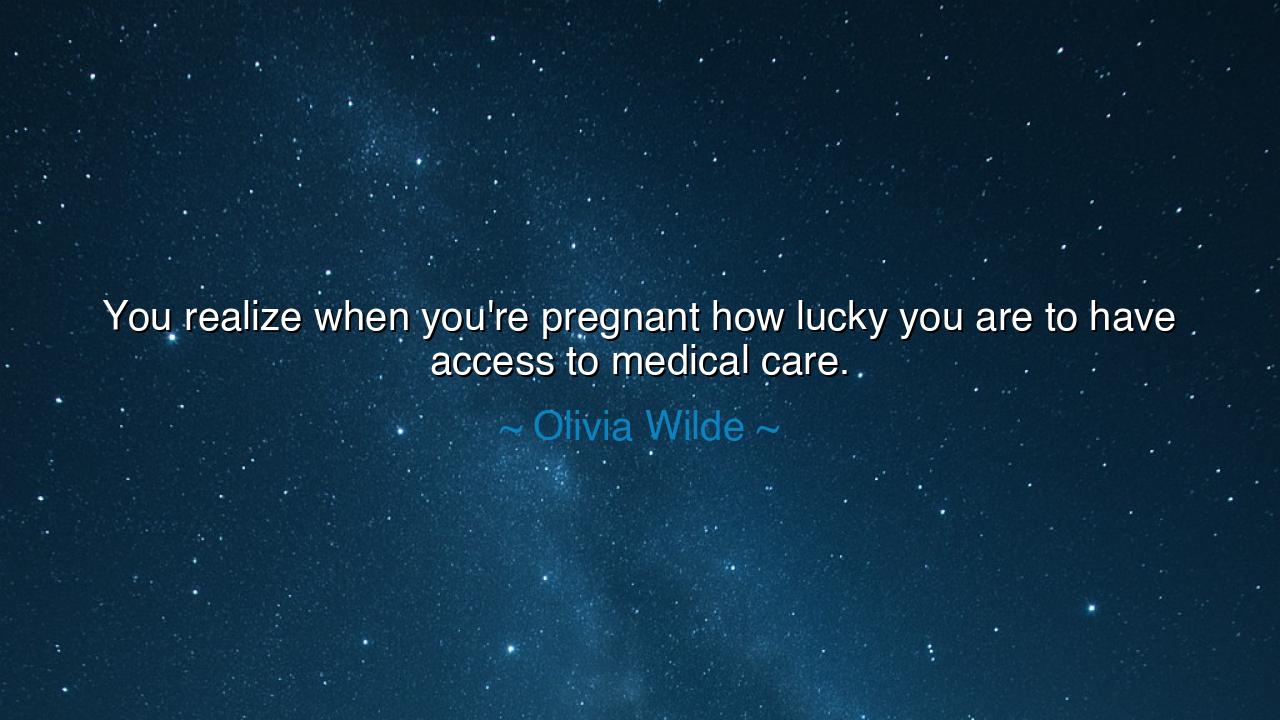
You realize when you're pregnant how lucky you are to have access






Hear the words of Olivia Wilde, spoken not in abstraction but in the sacred moment of bringing forth life: “You realize when you're pregnant how lucky you are to have access to medical care.” In this statement, simple yet profound, she acknowledges the fragile miracle of childbirth, and the immeasurable blessing of medical care. For in pregnancy, a woman walks the narrow bridge between life and death, carrying within her the future itself. To have guardians—physicians, nurses, midwives, and the knowledge of science—beside her in that hour is not merely convenience, but salvation.
The origin of her reflection lies in the personal transformation of motherhood. Pregnancy, though natural, is never trivial; it is at once wondrous and perilous. Through history, women faced this journey without the shield of modern medicine, and countless lives were lost to complications that today can be prevented. Wilde’s words reveal the awakening many mothers feel: the sudden awareness that something often taken for granted—access to care—is in truth a gift, one not universally shared across the world. Her gratitude is not selfish, but a recognition of the vast inequality that separates those who live and those who perish in childbirth.
The ancients, too, knew the dangers of childbirth. In every culture, women gathered around the mother-to-be, offering wisdom, herbs, and prayer, yet death in childbirth was a common shadow. The historian Herodotus wrote of queens and peasants alike dying in labor, for wealth could not purchase safety when medicine was scarce. Only in recent centuries have the advances of antisepsis, anesthesia, and skilled obstetrics turned childbirth into something safer, though still never free of risk. To be pregnant and cared for today is to stand on the shoulders of generations of women who endured peril without such aid.
Consider the story of Princess Charlotte of Britain in 1817. She was young, beloved, and heir to the throne, yet she died in childbirth along with her stillborn son. Her doctors, bound by the limited practices of their age, could not save her. The tragedy shook an entire nation, showing that lack of proper care claimed even those in power. Compare this to today, when a woman with access to prenatal medicine, monitoring, and skilled attendants can often be saved from such fate. Wilde’s reflection is born of this contrast: to be pregnant with support is fortune beyond measure.
The meaning of her words is more than gratitude; it is a call to awareness. Access to medical care is not universal, and to have it is not merely luck but a responsibility. For in many lands, women still die as Charlotte did, not from fate but from neglect. The difference between life and death may be as simple as a clinic too far away, or the absence of a trained midwife, or the inability to pay for services. Wilde reminds us that what is routine for some is unimaginable for others.
The lesson for us is clear: never take for granted the blessings of health and care. If you have access, be grateful, but let your gratitude become fuel for action. Support systems that bring medical care to mothers who lack it. Advocate for policies that protect maternal health as a universal right, not a privilege of the wealthy. For in ensuring the safety of mothers, we secure the survival of children, families, and the generations to come.
Practical action flows from this wisdom: donate to organizations that provide maternal care in developing nations; support clinics and midwives in your own community; speak openly of the importance of prenatal and postnatal health, breaking the silence that often surrounds childbirth. And if you are a parent, share your story—not to boast, but to awaken others to the truth that care is not guaranteed, and must be fought for.
Thus Wilde’s words endure as a testimony of gratitude and a summons to compassion. Pregnancy teaches vulnerability; it teaches dependence on the skill and kindness of others. To have access to medical care is to hold in one’s hands a gift paid for by centuries of struggle, discovery, and sacrifice. Let us honor that gift by ensuring it is extended to all. For only then will the miracle of birth be met not with fear, but with joy, in every corner of the world.






AAdministratorAdministrator
Welcome, honored guests. Please leave a comment, we will respond soon